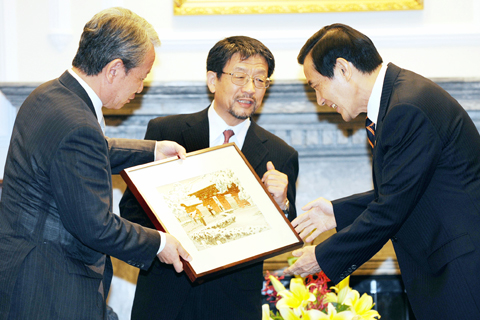President Ma Ying-jeou (馬英九) yesterday said the Economic Cooperation Framework Agreement (ECFA) recently signed with Beijing was not an international agreement because the relations between Taiwan and China are not those of two countries.
“We do not recognize China as a state, so our relationship with each other is not one of country-to-country,” he said.
“Cross-strait agreements are not international treaties signed between two countries, but they are very similar,” Ma added.

PHOTO: CNA
Ma made the remarks while meeting Japanese academics specializing in cross-strait affairs from the University of Tokyo at the Presidential Office yesterday.
Ma said his administration signed the trade deal based on the needs of the nation, public support and following legislative oversight.
On the legislative oversight, Ma said Premier Wu Den-yih (吳敦義) would report to the legislature, which would review the agreement clause by clause.
The accord must be voted on in its entirety and the legislature could attach a rider to the agreement if necessary, he added.
Once the agreement clears the legislature, Ma said it would come into effect within six months, during which the two sides will begin negotiations on trade in goods and services, investment protection and dispute settlement.
Ma said he expected future cross-strait negotiations to be more challenging and that his administration would be under more pressure.
“This is just the beginning,” he said.
Facing Beijing’s increasing pressure for military and political negotiations, Ma said he would not negotiate unification with China during his presidency. Nor would he pursue de jure independence or favor settling cross-strait disputes through military means.
Ma said he understood the ECFA was no panacea and that there were risks involved, but the government could minimize the risks and maximize opportunities.
Amid opposition concerns that the administration has compromised Taiwan’s sovereignty during cross-strait negotiations, Ma said Taipei and Beijing have signed 14 agreements and none of them indicated his administration made any political trade-offs or promises.

Actor Darren Wang (王大陸) was questioned by prosecutors for allegedly orchestrating an attack on a taxi driver after he was allegedly driven on a longer than necessary route in a car he disliked. The questioning at the New Taipei City District Prosecutors’ Office was ongoing as of press time last night. Police have recommended charges of attempted murder. The legally embattled actor — known for his role in the coming-of-age film Our Times (我的少女時代) — is under a separate investigation for allegedly using fake medical documents to evade mandatory military service. According to local media reports, police said Wang earlier last year ordered a

CAUTION: Based on intelligence from the nation’s security agencies, MOFA has cautioned Taiwanese travelers about heightened safety risks in China-friendly countries The Ministry of Foreign Affairs (MOFA) yesterday urged Taiwanese to be aware of their safety when traveling abroad, especially in countries that are friendly to China. China in June last year issued 22 guidelines that allow its courts to try in absentia and sentence to death so-called “diehard” Taiwanese independence activists, even though Chinese courts have no jurisdiction in Taiwan. Late last month, a senior Chinese official gave closed-door instructions to state security units to implement the guidelines in countries friendly to China, a government memo and a senior Taiwan security official said, based on information gathered by Taiwan’s intelligence agency. The

President William Lai (賴清德) should protect Taiwan Semiconductor Manufacturing Co (TSMC), and stop supporting domestic strife and discord, former president Ma Ying-jeou (馬英九) wrote on Facebook yesterday. US President Donald Trump and TSMC on Monday jointly announced that the company would invest an additional US$100 billion over the next few years to expand its semiconductor manufacturing operations in the US. The TSMC plans have promoted concern in Taiwan that it would effectively lead to the chipmaking giant becoming Americanized. The Lai administration lacks tangible policies to address concerns that Taiwan might follow in Ukraine’s footsteps, Ma wrote. Instead, it seems to think it could

Taiwan Semiconductor Manufacturing Co (TSMC), the world’s largest contract chipmaker, said yesterday that it is looking to hire 8,000 people this year, at a time when the tech giant is expanding production capacity to maintain its lead over competitors. To attract talent, TSMC would launch a large-scale recruitment campaign on campuses across Taiwan, where a newly recruited engineer with a master’s degree could expect to receive an average salary of NT$2.2 million (US$60,912), which is much higher than the 2023 national average of NT$709,000 for those in the same category, according to government statistics. TSMC, which accounted for more than 60 percent